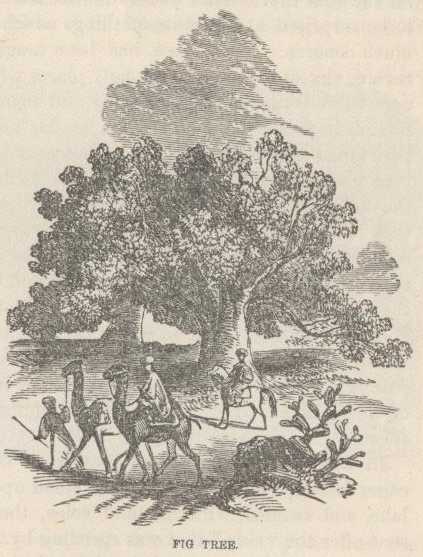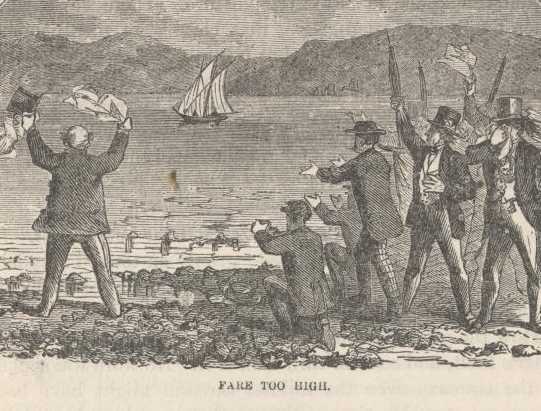Just before we came to Joseph’s Pit, we had “raised” a hill, and there, a few miles before us, with not a tree or a shrub to interrupt the view, lay a vision which millions of worshipers in the far lands of the earth would give half their possessions to see—the sacred Sea of Galilee!
Therefore we tarried only a short time at the pit. We rested the horses and ourselves, and felt for a few minutes the blessed shade of the ancient buildings. We were out of water, but the two or three scowling Arabs, with their long guns, who were idling about the place, said they had none and that there was none in the vicinity. They knew there was a little brackish water in the pit, but they venerated a place made sacred by their ancestor’s imprisonment too much to be willing to see Christian dogs drink from it. But Ferguson tied rags and handkerchiefs together till he made a rope long enough to lower a vessel to the bottom, and we drank and then rode on; and in a short time we dismounted on those shores which the feet of the Saviour have made holy ground.
 At noon we took a swim in the Sea of Galilee—a blessed privilege in this roasting climate—and then lunched under a neglected old fig-tree at the fountain they call Ain-et-Tin, a hundred yards from ruined Capernaum. Every rivulet that gurgles out of the rocks and sands of this part of the world is dubbed with the title of “fountain,” and people familiar with the Hudson, the great lakes and the Mississippi fall into transports of admiration over them, and exhaust their powers of composition in writing their praises. If all the poetry and nonsense that have been discharged upon the fountains and the bland scenery of this region were collected in a book, it would make a most valuable volume to burn.
At noon we took a swim in the Sea of Galilee—a blessed privilege in this roasting climate—and then lunched under a neglected old fig-tree at the fountain they call Ain-et-Tin, a hundred yards from ruined Capernaum. Every rivulet that gurgles out of the rocks and sands of this part of the world is dubbed with the title of “fountain,” and people familiar with the Hudson, the great lakes and the Mississippi fall into transports of admiration over them, and exhaust their powers of composition in writing their praises. If all the poetry and nonsense that have been discharged upon the fountains and the bland scenery of this region were collected in a book, it would make a most valuable volume to burn.
During luncheon, the pilgrim enthusiasts of our party, who had been so light-hearted and so happy ever since they touched holy ground that they did little but mutter incoherent rhapsodies, could scarcely eat, so anxious were they to “take shipping” and sail in very person upon the waters that had borne the vessels of the Apostles. Their anxiety grew and their excitement augmented with every fleeting moment, until my fears were aroused and I began to have misgivings that in their present condition they might break recklessly loose from all considerations of prudence and buy a whole fleet of ships to sail in instead of hiring a single one for an hour, as quiet folk are wont to do. I trembled to think of the ruined purses this day’s performances might result in. I could not help reflecting bodingly upon the intemperate zeal with which middle-aged men are apt to surfeit themselves upon a seductive folly which they have tasted for the first time. And yet I did not feel that I had a right to be surprised at the state of things which was giving me so much concern. These men had been taught from infancy to revere, almost to worship, the holy places whereon their happy eyes were resting now. For many and many a year this very picture had visited their thoughts by day and floated through their dreams by night. To stand before it in the flesh—to see it as they saw it now—to sail upon the hallowed sea, and kiss the holy soil that compassed it about: these were aspirations they had cherished while a generation dragged its lagging seasons by and left its furrows in their faces and its frosts upon their hair. To look upon this picture, and sail upon this sea, they had forsaken home and its idols and journeyed thousands and thousands of miles, in weariness and tribulation. What wonder that the sordid lights of work-day prudence should pale before the glory of a hope like theirs in the full splendor of its fruition? Let them squander millions! I said—who speaks of money at a time like this?
In this frame of mind I followed, as fast as I could, the eager footsteps of the pilgrims, and stood upon the shore of the lake, and swelled, with hat and voice, the frantic hail they sent after the “ship” that was speeding by. It was a success. The toilers of the sea ran in and beached their barque. Joy sat upon every countenance.
“How much?—ask him how much, Ferguson!—how much to take us all—eight of us, and you—to Bethsaida, yonder, and to the mouth of Jordan, and to the place where the swine ran down into the sea—quick!—and we want to coast around every where—every where!—all day long!—I could sail a year in these waters!—and tell him we’ll stop at Magdala and finish at Tiberias!—ask him how much?—any thing—any thing whatever!—tell him we don’t care what the expense is!” [I said to myself, I knew how it would be.]
Ferguson—(interpreting)—“He says two Napoleons—eight dollars.”
One or two countenances fell. Then a pause.
“Too much!—we’ll give him one!”
I never shall know how it was—I shudder yet when I think how the place is given to miracles—but in a single instant of time, as it seemed to me, that ship was twenty paces from the shore, and speeding away like a frightened thing! Eight crestfallen creatures stood upon the shore, and O, to think of it! this—this—after all that overmastering ecstacy! Oh, shameful, shameful ending, after such unseemly boasting! It was too much like “Ho! let me at him!” followed by a prudent “Two of you hold him—one can hold me!”

Instantly there was wailing and gnashing of teeth in the camp. The two Napoleons were offered—more if necessary—and pilgrims and dragoman shouted themselves hoarse with pleadings to the retreating boatmen to come back. But they sailed serenely away and paid no further heed to pilgrims who had dreamed all their lives of some day skimming over the sacred waters of Galilee and listening to its hallowed story in the whisperings of its waves, and had journeyed countless leagues to do it, and—and then concluded that the fare was too high. Impertinent Mohammedan Arabs, to think such things of gentlemen of another faith!
Well, there was nothing to do but just submit and forego the privilege of voyaging on Genessaret, after coming half around the globe to taste that pleasure. There was a time, when the Saviour taught here, that boats were plenty among the fishermen of the coasts—but boats and fishermen both are gone, now; and old Josephus had a fleet of men-of-war in these waters eighteen centuries ago—a hundred and thirty bold canoes—but they, also, have passed away and left no sign. They battle here no more by sea, and the commercial marine of Galilee numbers only two small ships, just of a pattern with the little skiffs the disciples knew. One was lost to us for good—the other was miles away and far out of hail. So we mounted the horses and rode grimly on toward Magdala, cantering along in the edge of the water for want of the means of passing over it.
How the pilgrims abused each other! Each said it was the other’s fault, and each in turn denied it. No word was spoken by the sinners—even the mildest sarcasm might have been dangerous at such a time. Sinners that have been kept down and had examples held up to them, and suffered frequent lectures, and been so put upon in a moral way and in the matter of going slow and being serious and bottling up slang, and so crowded in regard to the matter of being proper and always and forever behaving, that their lives have become a burden to them, would not lag behind pilgrims at such a time as this, and wink furtively, and be joyful, and commit other such crimes—because it would not occur to them to do it. Otherwise they would. But they did do it, though—and it did them a world of good to hear the pilgrims abuse each other, too. We took an unworthy satisfaction in seeing them fall out, now and then, because it showed that they were only poor human people like us, after all.